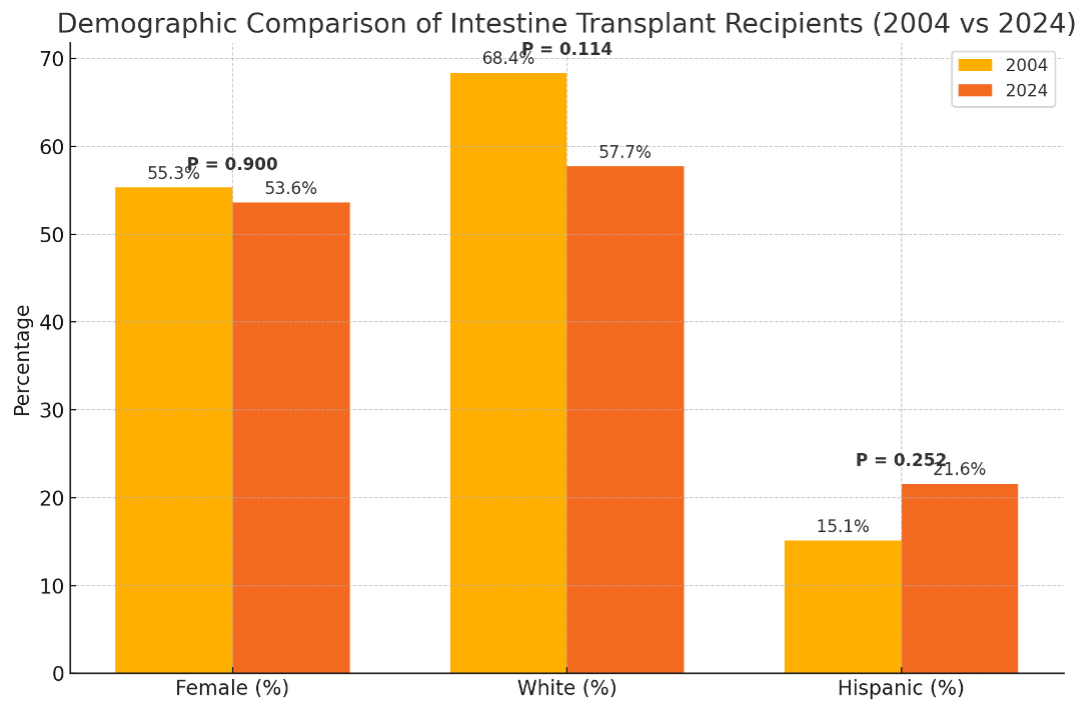Tuesday Poster Session
Category: Small Intestine
P6215 - Trends in Demographic, Insurance, and Clinical Indications of Intestine Transplant Recipients Between 2004 and 2024 Using OPTN Data
Tuesday, October 28, 2025
10:30 AM - 4:00 PM PDT
Location: Exhibit Hall

Razan Aburumman, MD
Henry Ford Health
Detroit, MI
Presenting Author(s)
Razan Aburumman, MD1, Sarine Tahmazian, MD1, Tala Al Saleh, MD1, Saif Nabeel, MD2
1Henry Ford Health, Detroit, MI; 2School of Medicine, The University of Jordan, Amman, 'Amman, Jordan
Introduction: Intestine transplantation is a rare but life-saving procedure for patients with irreversible intestinal failure. Tracking shifts in recipient characteristics over time helps inform equitable access and evolving transplant practices. This study compares demographics, insurance status, and clinical indications in U.S. intestine transplant recipients between 2004 and 2024.
Methods: We analyzed national data from the Organ Procurement and Transplantation Network (OPTN) as of January 1, 2025. Demographic variables (gender, race/ethnicity, citizenship), insurance type (private vs. Medicaid), and clinical indications (short gut syndrome, functional bowel disorders, graft failure) were compared between 2004 and 2024 using chi-square tests, using SPSS IBM version 26.0.
Results: A total of 152 intestine transplants were performed in 2004 and 97 in 2024. Female representation remained stable between 2004 and 2024 (55.3% vs. 53.6%, respectively, P = 0.900). The proportion of White recipients decreased from 68.4% to 57.7% (P = 0.114), while Hispanic recipients increased from 15.1% to 21.6% (P = 0.218). The percentage of transplant recipients with private insurance declined significantly from 48.7% to 35.1% (P = 0.049), and those with Medicaid coverage showed no significant change (36.8% vs. 32.0%, P = 0.469). The percentage of recipients who are U.S. citizens remained high but decreased slightly from 95.4% to 90.7% (P = 0.263). Regarding transplant indications, the proportion of patients with short gut syndrome declined from 65.1% to 39.2%, while retransplantation/graft failure increased from 2.0% to 15.5%. Functional bowel disorder indications declined from 16.4% to 7.2%.
Discussion: Over the past two decades, the demographic profile of intestine transplant recipients has remained relatively unchanged. However, there were notable shifts in clinical indications and insurance coverage. The rise in retransplantation and drop in short gut syndrome as the primary indication may reflect evolving patient complexity and transplant eligibility. A significant decline in private insurance suggests a shifting socioeconomic profile. These findings underscore the importance of continued surveillance and targeted policy efforts to ensure equitable access and outcomes in intestinal transplantation.

Figure: Trends in Demographics of Intestine Transplant Recipients Between 2004 and 2024
Disclosures:
Razan Aburumman indicated no relevant financial relationships.
Sarine Tahmazian indicated no relevant financial relationships.
Tala Al Saleh indicated no relevant financial relationships.
Saif Nabeel indicated no relevant financial relationships.
Razan Aburumman, MD1, Sarine Tahmazian, MD1, Tala Al Saleh, MD1, Saif Nabeel, MD2. P6215 - Trends in Demographic, Insurance, and Clinical Indications of Intestine Transplant Recipients Between 2004 and 2024 Using OPTN Data, ACG 2025 Annual Scientific Meeting Abstracts. Phoenix, AZ: American College of Gastroenterology.
1Henry Ford Health, Detroit, MI; 2School of Medicine, The University of Jordan, Amman, 'Amman, Jordan
Introduction: Intestine transplantation is a rare but life-saving procedure for patients with irreversible intestinal failure. Tracking shifts in recipient characteristics over time helps inform equitable access and evolving transplant practices. This study compares demographics, insurance status, and clinical indications in U.S. intestine transplant recipients between 2004 and 2024.
Methods: We analyzed national data from the Organ Procurement and Transplantation Network (OPTN) as of January 1, 2025. Demographic variables (gender, race/ethnicity, citizenship), insurance type (private vs. Medicaid), and clinical indications (short gut syndrome, functional bowel disorders, graft failure) were compared between 2004 and 2024 using chi-square tests, using SPSS IBM version 26.0.
Results: A total of 152 intestine transplants were performed in 2004 and 97 in 2024. Female representation remained stable between 2004 and 2024 (55.3% vs. 53.6%, respectively, P = 0.900). The proportion of White recipients decreased from 68.4% to 57.7% (P = 0.114), while Hispanic recipients increased from 15.1% to 21.6% (P = 0.218). The percentage of transplant recipients with private insurance declined significantly from 48.7% to 35.1% (P = 0.049), and those with Medicaid coverage showed no significant change (36.8% vs. 32.0%, P = 0.469). The percentage of recipients who are U.S. citizens remained high but decreased slightly from 95.4% to 90.7% (P = 0.263). Regarding transplant indications, the proportion of patients with short gut syndrome declined from 65.1% to 39.2%, while retransplantation/graft failure increased from 2.0% to 15.5%. Functional bowel disorder indications declined from 16.4% to 7.2%.
Discussion: Over the past two decades, the demographic profile of intestine transplant recipients has remained relatively unchanged. However, there were notable shifts in clinical indications and insurance coverage. The rise in retransplantation and drop in short gut syndrome as the primary indication may reflect evolving patient complexity and transplant eligibility. A significant decline in private insurance suggests a shifting socioeconomic profile. These findings underscore the importance of continued surveillance and targeted policy efforts to ensure equitable access and outcomes in intestinal transplantation.

Figure: Trends in Demographics of Intestine Transplant Recipients Between 2004 and 2024
Disclosures:
Razan Aburumman indicated no relevant financial relationships.
Sarine Tahmazian indicated no relevant financial relationships.
Tala Al Saleh indicated no relevant financial relationships.
Saif Nabeel indicated no relevant financial relationships.
Razan Aburumman, MD1, Sarine Tahmazian, MD1, Tala Al Saleh, MD1, Saif Nabeel, MD2. P6215 - Trends in Demographic, Insurance, and Clinical Indications of Intestine Transplant Recipients Between 2004 and 2024 Using OPTN Data, ACG 2025 Annual Scientific Meeting Abstracts. Phoenix, AZ: American College of Gastroenterology.
